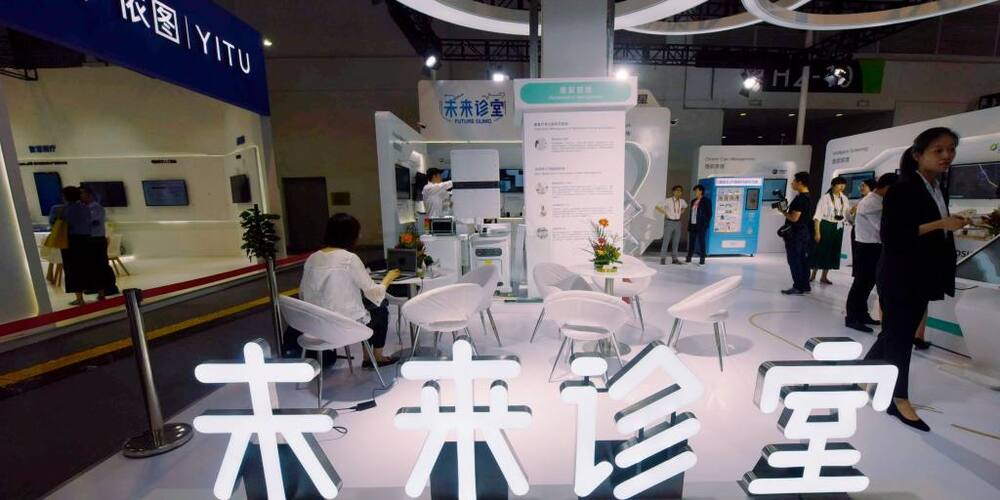Scientists at Fermilab in the U.S. have demonstrated, for the first time, sustained and long-distance teleportation of qubits of photons with fidelity greater than 90%.



✨ ′′ Using a high speed 5 G network, a London surgeon has performed remote experimental surgery for a banana based in the U.S. state of California.
This evolution opens up prospects for complicated remote surgeries without going through the trouble of future travel.
#IEEE_BAU_RAS
✨باستخدام شبكة 5G فائقة السرعة قام جرّاح في لندن بإجراء عملية جراحية تجريبية عن بُعد لموزة موجودة في ولاية كاليفورنيا الأمريكية.
هذا التطور يفتح الآفاق لإجراء عمليات جراحية معقدة عن بعد دون تكبد عناء السفر مستقبلاً.” #IEEE_BAU_RAS


Google Cloud expands its edge computing services by partnering with 200 developers to put their applications closer to enterprise customers.

I think it has its own niche. 😃
Whenever an artificial intelligence (AI) does something well, we’re simultaneously impressed as we are worried. AlphaGO is a great example of this: a machine learning system that is better than any human at one of the world’s most complex games. Or what about Google’s neural networks that are able to create their own AIs autonomously?
Like we said – seriously impressive, but a little unnerving perhaps. That is probably why we feel such glee when an AI goes a little awry. Remember that Chatbot created by Microsoft, the one that was designed to learn how to converse with people based on what it read on Twitter? Rather predictably, it quickly became a racist, foul-mouthed bigot.
Now, a new AI has appeared on the wilderness of the Web, and it goes by the name InspiroBot. As you might expect, it designs “Inspirational Posters” for you – you know, the “Shoot for the Moon. If you miss, you’ll land among the stars”-type quotes in an aesthetically pleasing font and plastered onto a calming, pretty background image of deep space or flowers or the sunrise or something.

From the COVID-19 vaccine to advances in machine learning, AI, improved W-Fi and 5G, and telemedicine, experts expect a move to “patient-centric” health next year.
COVID-19 accomplished what entrepreneurs, doctors, and activists couldn’t: Designing a healthcare system that works for patients instead of providers and health insurance companies.
The industry promised to be “patient-centered” for the last decade but only the harsh demands of COVID-19 have made this a reality. As Ian McCrae, CEO of Orion Health, described it, COVID-19 is ushering in the long-overdue transformation of the healthcare system and, finally, a move to “patient-centric” health.

That is partly because AI businesses are not consumer-facing. Because they are mostly providers of back end hardware and software to other businesses, or, more critically, to governments, AI business will not become giant platform companies servicing billions of users.
Nina Xiang is the founder of China Money Network, a media platform tracking China’s venture and tech sectors.
In 10 years no one will remember the names of China’s artificial intelligence unicorns. While many aspects of the coming AI revolution remain unpredictable, one thing is clear: no AI company will emerge as a Big Tech brand.
While the internet era of the 2000s, and the mobile internet era of the 2010s, created the Chinese tech giants of today, such as Baidu, Alibaba Group Holding, and Tencent Holdings, collectively referred to as BAT, as well as Toutiao, Meituan, Didi-Chuxing, together known as TMD, the AI era is unlikely to produce anything like that by comparison — even if overly zealous investors have nursed over a dozen AI unicorns in China worth tens of billions in total.

Hackers with possible links to Iran appear to have breached an unprotected human-machine interface system at an Israeli water reservoir that connected directly to the internet and lacked security protocols, according to industrial cybersecurity firm Otorio.
See Also: Live Webinar | Securing Mobile Endpoints to Protect IP in the Pharma Industry
The security firm reports that the alleged Iranian hacking group, referred to as “Unidentified TEAM,” published a video of the attack on an unnamed reclaimed Israeli water reservoir human-machine interface (HMI) system, which did not require any authentication to access and modify the system. This allowed the threat actors to tamper with the water pressure, change temperatures and more.

Not much of a surprise there…
Let’s say you hate 5G and genuinely believe it causes cancer or spreads COVID-19, despite there being no evidence to support those wild conspiracies. To shield 5G’s myriad evils, then, you put your WiFi router in a metallic box that “blocks about 90 percent” of the signal. There! Now you’re instantly protected from those treacherous waves of radiation!
This may sound like a made-up scenario, but 5G truthers really have bought these devices in droves. There’s just one small problem with their fool-proof plan: The kinds of containers that truly do block all electromagnetic radiation are called Faraday cages, and they’re not the same thing as these so-called “router guards” that look like glorified mesh file organizers. If they were real Faraday cages, none of your home WiFi signal would come through.
➡ DON’T LET TECH TRICK YOU. Master your digital world with best-in-class tech explainers and unlimited access to Pop Mech, starting NOW.

Since Xi put out the call to build up the new area, China’s tech giants have piled in. Alibaba Group Holding, Tencent Holdings, Baidu, Zhongguancun Science Park and Tsinghua University have all established projects in Xiongan. The projects include the use of sensors, 5G networks and facilities for supercomputing and big data in the pursuit of building up the smart city. Alibaba is the parent company of the Post.
JD Digits, the e-commerce giant’s big data arm, is building a smart city operating system that uses artificial intelligence for urban management.